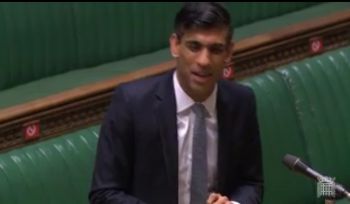University of Sussex academics respond to Chancellor's Plan for Jobs
By: Neil Vowles
Last updated: Wednesday, 8 July 2020

Chancellor Rishi Sunak
The Chancellor of the Exchequer Rishi Sunak presented his Plan for Jobs to Parliament today [Wednesday 8 July 2020] to outline how the government intends to boost job creation in the UK.
The plan includes a new £2 billion Kickstart Scheme designed to create hundreds of thousands of new, fully subsidised jobs for young people across the country.
Proposals include businesses being given £2,000 for each new apprentice they hire under the age of 25, a £111 million investment to triple the scale of traineeships in 2020-21, £17 million of funding to triple the number of sector-based work academy placements in 2020-21 and nearly £900 million to double the number of work coaches to 27,000.
Mr Sunak also pledged a £3 billion green investment package that could help support around 140,000 green jobs and upgrade buildings and reduce emissions.
Details include a scheme allowing homeowners and landlords in England will be able to apply for vouchers from a £2 billion Green Homes Grant scheme this year to pay for green improvements such as loft, wall and floor insulation and a £1 billion programme to make public buildings, including schools and hospitals, greener.
Here's how our energy policy and youth employment experts in the University of Sussex Business School responded to the anouncement:
Dr Mari Martiskainen, Senior Research Fellow in the Science Policy Research Unit (SPRU) at the University of Sussex Business School, said: “The government's announcement of a voucher scheme for improving the energy efficiency of the UK's homes is a welcome step in the right direction, especially as it provides free insulation to those on low-incomes, many of whom live in fuel poverty.
“Energy demand reduction is key in addressing the climate emergency, but this needs to be coupled with a wider and rapid switch to low carbon heat. We need to combine fixing our leaky homes with renewable energy and stripping polluting gas boilers out of homes.
“The UK has marketed itself as a leader in climate action, with the Prime Minister saying in December that he will make Britain the ‘cleanest, greenest’ country on Earth. It is time the government started to put its money where its mouth is and took action with a comprehensive whole-house retrofit programme that goes beyond insulation.”
Dr Marie Claire Brisbois, Lecturer In Energy Policy in the Science Policy Research Unit (SPRU) at the University of Sussex Business School, said: "While the funding package is a very welcome initial step, the funds committed fall short of what is required to upgrade the leakiest, least energy efficient housing in Europe and takes a piecemeal approach to what needs to be a comprehensive, system-wide transformation.
“Further significant investments will be required to transition to low carbon heat, provide sufficient funds or schemes for retrofitting all private and social housing stock, and incentivize retrofits in the private rental market.
“This can all be done more efficiently as a whole energy systems transformation package that addresses the larger systemic reforms associated with electrification, digitalisation, and decentralisation. This would have the potential to build upon the lifestyle changes the pandemic has highlighted as desirable including changes to working schedules and commuting patterns, active transportation and mobility services, and leisure practices.”
Dr Max Lacey-Barnacle, Research Fellow in Energy Justice in the Science Policy Research Unit (SPRU) at the University of Sussex Business School, said: "This is a step in the right direction but only a start.
"The £3 billion over one year is only a third of the total household insulation funding pledged in the Conservative 2019 manifesto and the UK will need all of that funding and much more to make the housing stock compatible with Net Zero targets.
"The figure is also dwarfed by other countries' green stimulus funding commitments such as Germany (40bn euros) and France (15bn euros), so I would hope there is more to come from the Chancellor.
"England has not had home energy efficiency funding for over half a decade, so at least this will level up some devolved disparities. Wales, Scotland and Northern Ireland have had their own programmes up and running for a number of years."
Professor Jackie O’Reilly, Co-Director of the Digital Futures at Work Research (Digit) Centre and expert in youth employment at the University of Sussex Business School, said: “Financial incentives to help companies with the costs of taking on new staff is only a short-term measure. The funding might pay their wages for three months, potentially enough to help them get a foot in the door; but will do nothing to end the churning of young people as they are frequently and erratically propelled in and out of work, often through zero-hours contracts.
“While Covid-19 has created an immediate crisis with a massive fallout of jobs in hospitality and retail where young people usually work, there also needs to be consideration given to the impact of the digital transformation of work that is really going to affect the types of jobs in the future and the skill required getting these.
“The inherently fragmented and marketised structure of training provision in the UK has created a very precarious pathway for young people in the past and so giving young people access to the right advice is clearly central to navigate the complex array of offerings.
“Acquiring digital skills will be key and there are programmes in the US that have been successful in providing tightly-designed training and mentorship programmes targeted at low-income youth, and those from minority ethnic communities that the UK should be looking to take inspiration from. The measure for employers is a short-term fix that will only work while the financial stimulus taps are running, and may not be enough to overcome the longer-term hurdles.”
